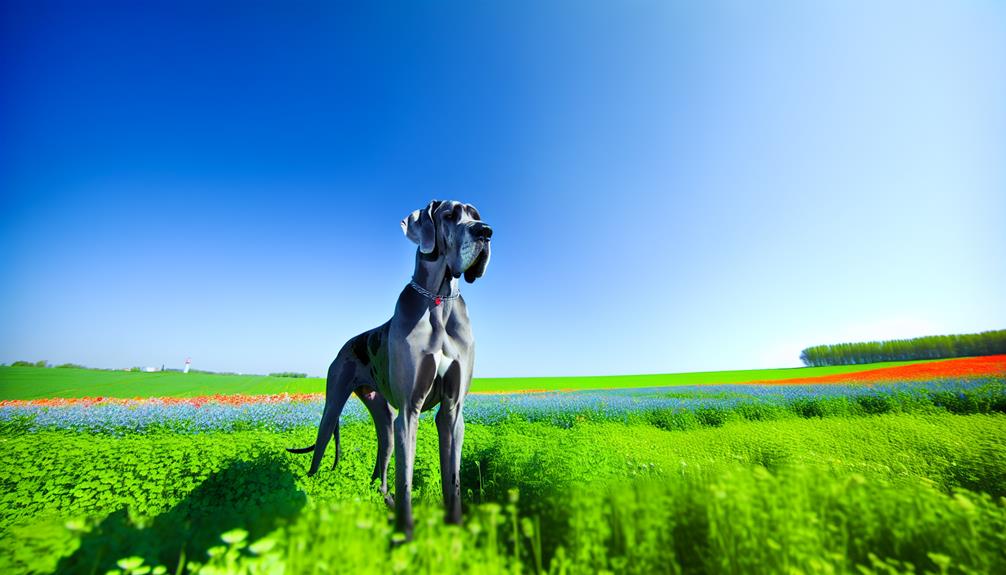
18 Apr Great Danes: How Long Do They Live?
If you're considering adding a Great Dane to your family, you may wonder about their lifespan. With an average of 7 to 10 years, various factors influence how long these majestic dogs can live. Genetic diversity, health monitoring, and responsible breeding all come into play when discussing Great Dane longevity. Understanding common health concerns and the importance of proper care can significantly impact your Dane's quality of life. Dive deeper into the factors that contribute to the lifespan of Great Danes to ensure you provide the best possible care for your furry companion.
Average Lifespan of Great Danes
Great Danes typically have an average lifespan ranging from 7 to 10 years, which is relatively shorter compared to many other dog breeds. Despite their imposing size, Great Danes are unfortunately not blessed with longevity. Their large size may contribute to certain health issues that impact their lifespan.
One common health concern in Great Danes is Cardiomyopathy (DCM), a heart condition that affects the heart muscle. This genetic variety within the breed can lead to increased susceptibility to such diseases, influencing their life expectancy.
To help your Great Dane live a longer and healthier life, it's essential to be aware of these common health issues and work closely with your veterinarian to monitor and address any potential problems. By understanding the genetic background and specific health risks associated with Great Danes, you can take proactive steps to ensure your canine companion enjoys a fulfilling and extended life.
Factors Affecting Great Dane Longevity
When it comes to the longevity of your Great Dane, factors such as age and genetics, diet, exercise, and health care practices all play vital roles.
Understanding how these elements impact your dog's lifespan can help you make informed decisions to promote their overall well-being.
Age and Genetics
With genetic factors playing a significant role in determining the lifespan of Great Danes, their longevity is notably impacted by their large size compared to smaller breeds. When it comes to age and genetics, consider the following:
- Genetic Diversity: The genetic makeup of a Great Dane significantly influences its lifespan, highlighting the importance of good breeding practices.
- Large Size: The sheer size of Great Danes contributes to a shorter lifespan compared to smaller breeds, with factors like joint health and heart strain playing a crucial role.
- Life Expectancies: Giant breeds, including Great Danes, generally have shorter life expectancies compared to smaller breeds due to their size, emphasizing the need for specialized care and monitoring.
Diet and Exercise
What key role do diet and exercise play in ensuring the longevity of Great Danes?
A balanced diet is essential for their overall well-being, tailored to their specific breed and size requirements. Providing proper nutrition not only supports their health but also contributes to a longer lifespan.
Regular exercise is equally crucial as it helps them maintain a healthy weight, reduces stress levels, and boosts their immune system. However, it's important to avoid excessive activity after meals to prevent stomach bloat, a common issue in Great Danes.
Health Care Practices
To enhance the longevity of your Great Dane, implementing proper health care practices is crucial in addressing factors that affect their lifespan. Here are essential practices to consider:
- Regular Vet Check-ups: Routine visits to the vet can help identify health issues early on and ensure timely intervention.
- Proper Nutrition: Providing a balanced diet tailored to your Great Dane's needs can support their overall health and well-being.
- Responsible Breeding: Opting for responsible breeders who prioritize genetic health can help mitigate common health issues and extend your Great Dane's lifespan.
Common Health Issues in Great Danes
Prone to bloat, hip dysplasia, and dilated cardiomyopathy, Great Danes commonly face significant health challenges that require proactive management for a longer, healthier life. Stomach bloat is a severe condition in Great Danes that demands immediate veterinary care to prevent potential fatalities.
Hip dysplasia, a genetic condition, can cause mobility issues and discomfort for these large dogs. Dilated cardiomyopathy, a prevalent heart disease in Great Danes, may lead to heart failure if not monitored and managed properly.
To extend a Great Dane's lifespan and ensure their well-being, it's crucial for owners to be vigilant about these health problems. Regular check-ups, a balanced diet, and appropriate exercise can help mitigate the risks associated with these common issues. Early detection and intervention play a vital role in addressing these health concerns effectively.
Importance of Proper Nutrition
Proper nutrition plays a pivotal role in maintaining the overall health and longevity of Great Danes. When it comes to ensuring your Great Dane's well-being, the quality of their diet is paramount. Here are three essential points to consider:
- Choose High-Quality Dog Food: Opt for dog food where meat is listed as the primary ingredient. This will provide essential nutrients and support your Great Dane's health.
- Avoid Grains as the First Ingredient: Great Danes may benefit from a grain-free diet. Avoid dog foods with grains as the first ingredient, as these may not align with their nutritional requirements.
- Consult with a Vet for Tailored Advice: Every Great Dane is unique, so consulting with a vet for personalized nutritional recommendations based on their breed, size, and health status is crucial for maintaining their quality of life.
Exercise Recommendations for Great Danes
For optimal health and well-being, Great Danes require consistent daily exercise ranging from 30 to 60 minutes. Daily exercise is crucial for Great Danes to stay healthy and happy.
However, it's important to avoid vigorous activity immediately after meals to prevent the risk of stomach bloat, a condition that can be dangerous for Great Danes. When exercising your Great Dane, opt for softer surfaces like grass or dirt paths to reduce the strain on their joints, which can help prevent injuries and discomfort.
Regular exercise not only benefits the physical health of Great Danes but also strengthens the bond between you and your furry companion. Whether it's going for a walk or a jog, engaging in physical activities together can improve both your well-being and that of your Great Dane.
Role of Responsible Breeding Practices
To ensure the health and well-being of Great Danes, understanding the significance of responsible breeding practices is paramount. Responsible breeding plays a crucial role in the overall well-being of the breed. Here are three key aspects to consider:
- Reducing Genetic Health Problems: By following responsible breeding practices, breeders can significantly reduce the occurrence of genetic health issues in Great Danes. This leads to healthier puppies and contributes to the longevity of the breed.
- Adherence to Great Dane Standards: It's essential for breeders to be well-versed in Great Dane standards to ensure that the puppies meet the required criteria for size, temperament, and overall health. This adherence helps in maintaining the integrity of the breed.
- Avoiding Inbreeding and Ensuring Transparency: Responsible breeders avoid inbreeding practices to prevent genetic diseases. Transparency in breeding practices, including sharing information on health screenings and lineage, is crucial for potential puppy buyers to make informed decisions.
Veterinary Check-ups for Great Danes
Regular veterinary check-ups play a crucial role in monitoring the overall health and well-being of Great Danes. These annual check-ups are essential for early detection and prevention of common health issues such as bloat, hip dysplasia, and heart conditions that can affect this breed.
During these check-ups, veterinarians can provide tailored guidance on nutrition, exercise, and preventive care specific to Great Danes, helping you ensure your dog's optimal health. By detecting health concerns early on, veterinary check-ups enable better management, potentially extending your Great Dane's lifespan.
Regular visits to the vet not only contribute to the longevity of your pet but also guarantee a higher quality of life. Therefore, prioritizing these regular check-ups is key to proactively addressing any potential health conditions and providing the necessary care to keep your Great Dane healthy and thriving for years to come.
Enhancing Great Dane Longevity
To enhance your Great Dane's longevity, focus on providing a balanced diet and regular exercise routine.
Ensure you schedule routine check-ups with a trusted veterinarian to monitor their overall health and catch any potential issues early.
Diet and Exercise
Enhancing the longevity of your Great Dane involves providing a balanced diet tailored to their breed and size, along with regular exercise to maintain their health. When focusing on diet and exercise for your Great Dane, keep the following key points in mind:
- Balanced Diet: Ensure your Great Dane's diet consists of high-quality dog food with meat as the primary ingredient. This provides essential nutrients for their well-being.
- Preventing Stomach Bloat: Feed smaller meals throughout the day and avoid excessive activity after eating to reduce the risk of stomach bloat, a common concern in Great Danes.
- Regular Exercise: Engage your Great Dane in daily physical activities to promote their overall health and longevity. Regular exercise helps in maintaining their weight and muscle tone.
Regular Vet Check-ups
Maintaining your Great Dane's health and longevity requires consistent veterinary check-ups to monitor their well-being and address any potential issues proactively. Regular vet check-ups play a vital role in ensuring your Great Dane's health by allowing early detection of any underlying problems. These visits enable your vet to provide preventive care, administer necessary vaccinations, and assess overall wellness.
Monitoring your Great Dane's growth and development through routine examinations is crucial, especially in identifying breed-specific health risks. By scheduling annual check-ups, you establish a baseline for your Great Dane's health, aiding in long-term care planning and ultimately contributing to their longevity. Prioritizing these regular vet check-ups will help keep your Great Dane happy, healthy, and thriving.








No Comments